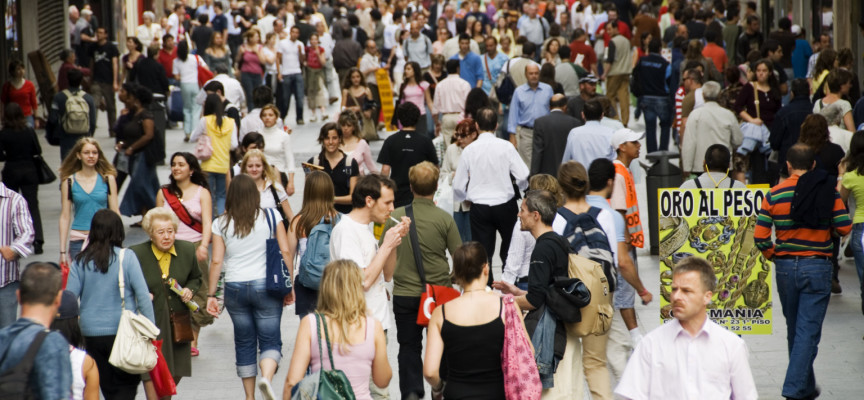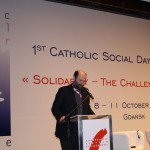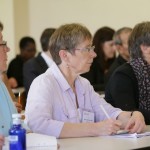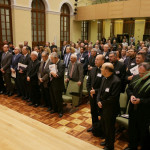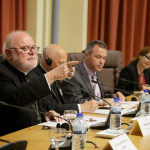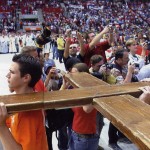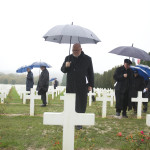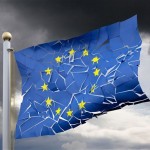With a call for solidarity as the way to Europe’s future, the first European Social Days came to their end five years ago, in Gdansk. Those words were said in a place that is a symbol not only for Poland, but for the whole Europe: the entrance of the shipyards where the adventure of Solidarnosc began. Five years have gone by since that first meeting among European Catholics and the situation in the old continent seems, if possible, even more difficult. The economic and social crisis do not seem to soften their grips, making inequalities growing; the anti- Europe wind damages the heart of the institutions and, more seriously, war has dramatically leaned at the door of the common European home, bringing back memories from a time that seemed so far away.
A gloomy picture in which Catholics are called to bring the hope that comes from faith. They shall show a light that needs to be nurtured through prayer, work, dialogue and reflection: the four elements that will be the cornerstones of the second edition of the European Social Days taking place in Madrid, September 18 to 21, under the auspices of the CCEE (Council of European Bishops’ Conferences) and the COMECE (Commission of the Bishops’ Conferences of the European Community) in collaboration with the Spanish Bishops’ Conference and the Archdiocese of Madrid.
“The Christian faith and the future of Europe”, is the theme of the four days that will be attended by 180 participants: 77 delegates from 29 countries, 4 cardinals, 19 bishops, 26 representatives of the European churches, 40 delegates from the Spanish capital city.
“In these coming Days we want to re-awaken the responsibility each of us has with regard to the social and charitable activity of the Catholic Church in Europe, in response to Pope Francis’ call for the Church to go out to evangelise”, stated a few days ago Mgr. Giampaolo Crepaldi, archbishop from Trieste and President of the CCEE social commission Caritas in Veritate. “Pope Francis – wrote mgr. Duarte da Cunha and Fr. Patrick H. Daly, respectively Secretaries-General of CCEE and COMECE – has brought a fresh and challenging perspective to many of the issues at the heart of contemporary Europe’s search for identity and to the questions which inform political debate at every level”. This, they affirm, represents “a huge opportunity for the Church to contribute to the reflection about the profile of Europe’s future”. The Social Days will be therefore a particularly significant moment of reflection.
According to Mgr. Gianni Ambrosio, Bishop of Piacenza-Bobbio and Vice-President of Comece “today’s Europe is often missing, both among European leaders and in many European citizens, a broad perspective”. What mgr. Ambrosio defines “the restricted and short-sighted vision of particular interests” shall be overcome through “a stronger European political cohesion and greater solidarity between the European nations, but also through a recovery of that passionate message which has been handed down to us by the founding fathers and builders of the common Europe, animated by the light of Christian hope”. The Spanish days shall help to make such a recovery.
The detailed daily programme and the possibility to follow some of the debates in streaming are available on www.catholicdays.eu .
Con un richiamo alla solidarietà come futuro dell’Europa si erano chiuse, cinque anni fa a Danzica, le prime Giornate sociali europee. Parole pronunciate in un luogo simbolo non solo per la Polonia, ma per l’intera Europa: l’ingresso dei cantieri navali da cui partì l’avventura di Solidarnosc. Sono passati cinque anni da quel primo appuntamento dei cattolici europei e la situazione nel vecchio continente sembra, se possibile, ancora più difficile. La crisi economica e sociale non attenua la sua presa, facendo crescere le disuguaglianze, il vento dell’antieuropeismo sferza il cuore delle istituzioni e, cosa più grave, la guerra si è affacciata prepotente alla porta della comune casa europea, riportando alla mente ricordi di un tempo che sembrava ormai passato.
Un quadro a tinte fosche in cui i cattolici sono chiamati a portare la speranza che nasce dalla fede. Una luce che ha bisogno di essere alimentata con la preghiera, il lavoro, il dialogo e la riflessione: i quattro elementi che saranno alla base della seconda edizione delle Giornate sociali europee, in programma a Madrid dal 18 al 21 settembre, promosse da CCEE (Consiglio delle Conferenze episcopali d’Europa) e COMECE (la Commissione delle Conferenze episcopali presso la Comunità Europea), in collaborazione con la Conferenza episcopale spagnola e l’arcidiocesi madrilena.
“Fede cristiana e futuro dell’Europa”, questo il tema attorno al quale si articoleranno i lavori ai quali parteciperanno 180 persone: 77 delegati di 29 Paesi, 4 cardinali, 19 vescovi, 26 rappresentanti delle Chiese europee, 40 delegati dalla capitale spagnola.
“In queste giornate vogliamo risvegliare la responsabilità che ognuno di noi ha per quanto riguarda l’attività sociale e caritativa della Chiesa cattolica in Europa, in risposta all’appello di papa Francesco alla Chiesa di uscire ed evangelizzare”, spiega a pochi giorni dall’apertura dei lavori mons. Giampaolo Crepaldi, arcivescovo di Trieste e presidente della commissione sociale CCEE “Caritas in Veritate”. “Papa Francesco – scrivono mons. Duarte da Cunha e padre Patrick H. Daly, rispettivamente segretari generali di CCEE e COMECE – ha introdotto una prospettiva fresca e impegnativa su molte questioni che stanno al cuore della ricerca contemporanea di un’identità europea e su questioni che toccano il dibattito politico a vari livelli”. Questo, spiegano, rappresenta una “grande opportunità per la Chiesa di contribuire alla riflessione sul profilo dell’Europa del futuro” da valorizzare durante le Giornate sociali.
Per mons. Gianni Ambrosio, vescovo di Piacenza-Bobbio e vicepresidente Comece, infatti, “manca all’Europa di oggi, tanto da parte dei suoi leader come da parte dei cittadini, una visione di largo profilo”. Quella che mons. Ambrosio definisce “la visione ristretta e miope d’interessi particolari” potrà essere superata attraverso “una più forte coesione europea politica e una maggiore solidarietà tra le nazioni, ma anche con un recupero di quel messaggio appassionato tramandato dai padri fondatori e costruttori dell’Europa comune, animato dalla luce della speranza cristiana”, recupero che le giornate spagnole potranno aiutare a compiere.
Il programma dettagliato delle giornate e il collegamento per seguire alcuni momenti in diretta streaming sono disponibili su www.catholicdays.eu .

